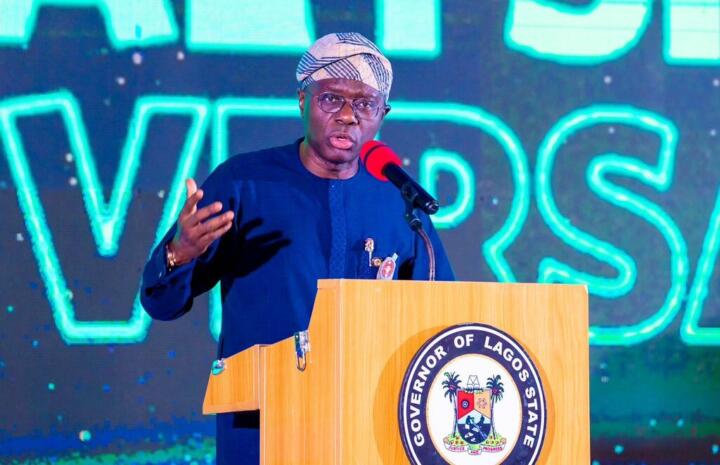Lagos State Governor Babajide Sanwo-Olu has reaffirmed his administration’s commitment to transforming the state’s transportation landscape, stating that the $410 million Omi Eko project will redefine water transportation in Nigeria’s commercial hub. The governor, speaking during a recent inspection of the project, said the initiative is a bold step toward providing safe, reliable, and sustainable transport alternatives for residents of Lagos.
According to Sanwo-Olu, the Omi Eko project — which translates to “Lagos Water” — is designed to modernise the city’s waterways and ease congestion on its overstretched road networks. Funded through a partnership involving the Lagos State Government, international development partners, and private investors, the initiative will improve ferry operations, construct new terminals, and upgrade jetties across the state.

The governor noted that Lagos, with its vast network of waterways spanning over 300 kilometres, has long underutilised this natural advantage. He emphasised that the Omi Eko project seeks to unlock the full potential of water transport as a viable alternative to road travel, thereby reducing traffic gridlock and promoting economic productivity. “This project is more than just an investment in infrastructure; it is an investment in the future of mobility in Lagos,” Sanwo-Olu said.
He explained that the project would provide modern ferry terminals equipped with passenger facilities, digital ticketing systems, and safety monitoring tools. The initiative also includes the acquisition of eco-friendly ferries powered by clean energy sources, in line with the state’s commitment to sustainability and climate resilience. “We are determined to make Lagos a model megacity where innovation drives transportation,” the governor added.
Sanwo-Olu disclosed that the state government has been working closely with global partners, including the World Bank and other international financial institutions, to ensure the project’s successful execution. He added that the Omi Eko initiative will complement ongoing efforts under the Lagos State Strategic Transport Master Plan (STMP), which integrates road, rail, and water systems into a unified network.
The Lagos Metropolitan Area Transport Authority (LAMATA), which is overseeing the implementation, described the Omi Eko project as one of the most ambitious water transport initiatives in sub-Saharan Africa. The agency said the $410 million funding would be channelled toward constructing new jetties, dredging waterways, establishing maintenance depots, and improving navigation safety.
Managing Director of LAMATA, Mrs. Abimbola Akinajo, stated that the project will also create thousands of direct and indirect jobs. “We expect significant employment opportunities during both construction and operations. Ferry operators, boat builders, and logistics service providers will all benefit,” she said.
Akinajo further revealed that the first phase of the Omi Eko project will connect key corridors such as Ikorodu, Marina, Victoria Island, Apapa, and Badagry, enabling residents to move seamlessly between coastal communities. “Our vision is to make water transport a preferred mode of movement in Lagos, not just an alternative,” she added.
Stakeholders in the transport and maritime sectors have lauded the Lagos State Government’s vision, describing the project as timely and strategic. The Chairman of the Waterfront Boat Owners and Transporters Association of Nigeria (WABOTAN), Mr. Babajide Adewale, said the project would enhance passenger confidence in water travel. “With improved infrastructure and safety measures, we expect more Lagosians to embrace ferries as a daily means of commuting,” he said.
Economists and urban planners have also praised the Omi Eko initiative for its potential to boost investment in the state’s blue economy. They argue that the improved transportation network could open new business opportunities in tourism, real estate, and logistics. “An efficient water transport system will decongest the city, attract investors, and improve the overall quality of life,” said urban development consultant, Dr. Femi Lawal.
The state government has assured residents that the Omi Eko project will adhere to international safety and environmental standards. Sanwo-Olu stated that the administration is committed to implementing strict regulations on watercraft operations to prevent accidents and ensure passenger safety. “Our goal is to make water travel as safe as land and air transport,” he declared.
He added that beyond transportation, the Omi Eko project will have significant environmental benefits. By promoting water-based commuting, Lagos will reduce its carbon footprint and align with global efforts to combat climate change. The deployment of electric and hybrid ferries will also contribute to cleaner air quality and reduced dependence on fossil fuels.
Residents have expressed optimism about the project, noting that it could greatly reduce travel times across the metropolis. “If the ferry system is well-organised, I can get from Ikorodu to Victoria Island in less than 30 minutes,” said a commuter, Mrs. Omolara Odu, who currently spends up to two hours daily in traffic.
As construction activities intensify, the state government has reiterated its commitment to transparency and accountability in the use of funds. The governor assured that all contractors involved have been selected through due process and that the project would be delivered on schedule.
Sanwo-Olu concluded by emphasizing that the Omi Eko project is a symbol of Lagos’ ambition to become a truly global city. “We are building a Lagos that works for everyone—a Lagos where transportation is seamless, inclusive, and sustainable,” he said.
When completed, the $410 million Omi Eko project is expected to stand as a landmark achievement, reshaping how Lagosians commute and setting a new standard for water transportation infrastructure in Africa’s largest city.
Support InfoStride News' Credible Journalism: Only credible journalism can guarantee a fair, accountable and transparent society, including democracy and government. It involves a lot of efforts and money. We need your support. Click here to Donate
